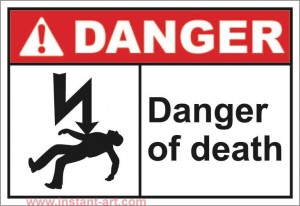Danger of death: Which audit firm will go down first?
By Ian Fraser
Published: The Herald Business
Date: November 6th, 2008

The accountancy firms that audited our distressed banks are coming under increased scrutiny
The partners of “Big Four” accountancy firms have good reason to feel nervous at the moment. Already the world’s largest accountancy firm PricewaterhouseCoopers, which was responsible for the audits of the failed banks like BCCI and Barings in the 1990s, has been criticized over its role as auditor to Northern Rock.
With bank collapses and government bail-outs now coming in thick and fast, questions about the quality of the audits provided by ‘big four’ firms to their banking clients are reaching a crescendo. If the banks they audited were among the more inept and reckless ones, such as HBOS, then the questions are ringing even louder. Prem Sikka, professor of accounting at the University of Essex, says:
“Many of the distressed [banks] gorged themselves on a diet of toxic debts, off-balance-sheet accounting, dubious asset values and questionable business models. Yet the auditors failed to notice any of the red flags.”
The auditor that is currently coming under most scrutiny is KPMG. The firm, which owes its origins to the Glaswegian firm Thomson McLintock has, within the past several months, signed off the accounts of some of the world’s most egregious bank collapses – including Bradford & Bingley, HBOS, Fortis, Hypo Real Estate and Wachovia. And other large audit firms such as Deloitte and PwC cannot rest on their laurels. Each has green-lighted the accounts for one or more failed banks in the past nine months.
The Enron saga has shown that, whenever auditors use the audit as a loss leader with which to get a toe in the door to win higher value work from the same clients, they are likely to be compromised. Invariably in such a scenario, their auditors tend to give managements an ‘easy ride’. Yet the practice of selling additional non-audit services to audit clients has not stopped. In 2007 Deloitte – whose UK senior partner John Connolly was paid £5.7m last year – received a total of £14.2m in non-audit fees from its client RBS last year. Overall Deloitte was paid £31.2m by RBS, of which only £17m was for the audit. KPMG pocketed a total of £11.4m for services provided to HBOS (of which some £8m, or 70% was for the audit.)
If it emerges that an audit firm has been negligent in the auditing of banks – or perhaps even colluded with bank managements to distort the books or suppress irregularities – they are probably going to have to pay a heavy price. Given that taxpayers have just had to dig deep in their pockets to bail-out most of the UK’s banks, the mood among investors, regulators and the general public, is hardly going to be one of forgiveness. In the event of such a case emerging, some City types warn that the accountancy firm responsible could implode, in much the same way that Andersen imploded following the Enron scandal.
Peter Elwin, head of accounting and valuation at JP Morgan Cazenove, says fear of such a scenario has been stalking financial markets for days. He thinks that one leading accountancy firm could be about to crash and burn in much the same way Andersen did, as its clients seek to distance themselves from reputational and financial harm by sacking them as auditors. In Elwin’s hypothetical example, all that firm’s audits would lose their currency in investors’ eyes. Elwin told a roundtable event (which paradoxically was hosted by KPMG).
“We’re in Andersen territory here. We’re in that kind of market right now.”
Elwin also warned that were one audit firm revealed to have been involved in a string of corporate failures (as KPMG has been), it would also create a field day for short-sellers who would short the stock of any firm it audited.
“I can guarantee that I would get calls left right and centre, and the first of these would be from the hedge funds. They would say, “I want a list of [the audit firm’s] clients” and then, as long as they weren’t financial stocks, they’d short the pants off the [clients].”
An edited version of this article was published in The Herald Business in November 2008
Short URL: https://www.ianfraser.org/?p=744
